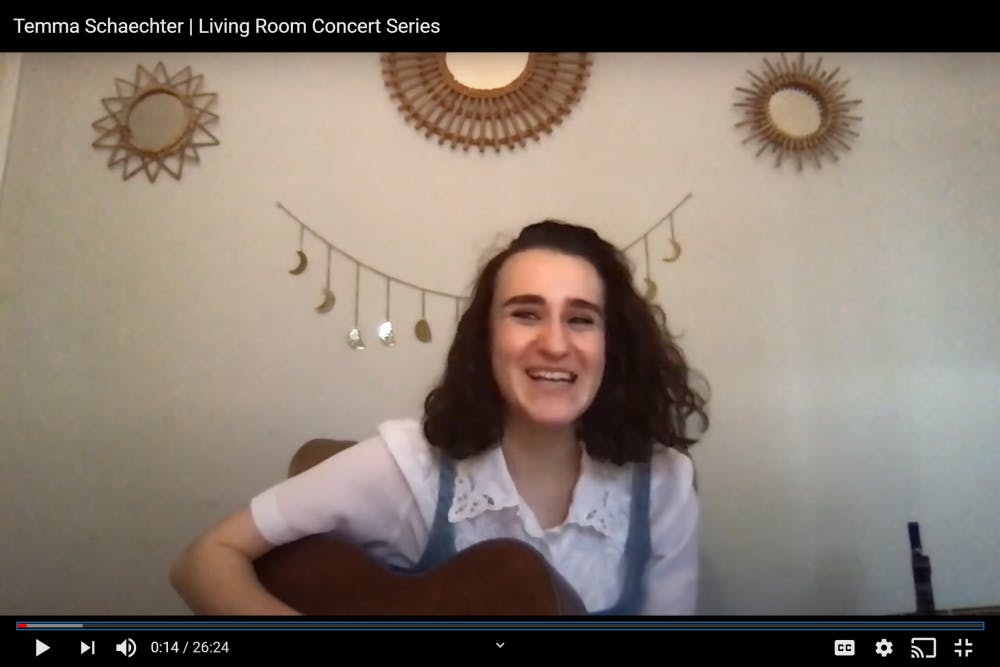On Thursday, Sept. 17, the Brown Arts Initiative welcomed students to a livestreamed “Living Room Concert” by Temma Schaechter ’21, a musician and aspiring psychologist who performed a series of original songs accompanied by a discussion of emotional processing through music.
Danielle Izzi, a University event specialist, introduced Schaechter as having a musical background in “folk, jazz, musical theater, classical and Yiddish music.”
Schaechter opened the event with “State of Not Needing,” a self-composed song that brought her “a lot of solace” during her months in quarantine. Even though she wrote this song before the COVID-19 pandemic hit the United States, she found herself returning to it for comfort during lockdown.
“It feels like a reminder that I don’t really need everything that goes on in the outside world … the validation, superficial stuff … the parties. I don’t even need to see human beings to be safe and healthy and okay,” she said.
Schaechter went on to perform a series of songs that conveyed more emotional turmoil. She described her second song as “a story of healing from something which at the time was very painful … trying to find a voice in a time when I felt really voiceless,” she said at the event. “The agency of the song is found in the lines, ‘Hear me start to sing tonight, I’ll drown you out this time.’”
Her third song was “a message to a friend who was … going through a hard time,” she said. Through the songwriting process, she said she sought to recognize and validate her friend’s struggles. “I hope this song serves as a reminder for everyone out there that however you’re feeling is valid and that you are loved and safe.”
Schaechter then switched from a ukulele to the electric guitar to perform her fourth number: “Blind Me With A Thousand Suns.” The song was dedicated to her professor, Erin McKeown ’00, who has reminded her of the importance of angry songs. “Playing this type of music can be very cathartic,” Schaechter explained. McKeown said that Schaechter performed her song “with great conviction.”
McKeown, a professor of the practice at BAI, commented on the depth of her setlist and the thought she put into moving between songs. “It was wonderful to see Temma perform her own songs,” McKeown wrote in an email to The Herald. “She’s got big talent and she’s exploring all corners of it now, which is exactly what a young artist should be doing at this stage of their career.”
To close out her performance, Schaechter played what she described as her “most hopeful song,” “Umbrella Boy.” “It’s about finding love,” she said. “We all need a little — a lot — of that,” she said.
At the end of the livestream, the comment section was full of positive affirmations and congratulations by Schaechter’s friends, family, teachers and fellow University students.
Schaechter said that she felt very fortunate to share her music when many artists are unable to do so during COVID-19. “Being able to connect and share this moment with you all is really special,” she said.
Schaechter also thanked McKeown and her peer mentor Lily Porter Wright ’20, who helped her build confidence in songwriting and performance.
Schaechter hopes that the music she writes “is as healing for others as it is for her.”
“I spent a lot of my summer reflecting on my own identities and privileges and how I can use my skills and platform to advocate for racial justice and equity,” Schaechter said. She said that Black musicians and artists have inspired her to incorporate “jazz, blues, R&B, pop, gospel,” and other musical genres into her work. “It’s important for all musicians to recognize and educate ourselves on the impact of Black artists … Black lives matter always.”

ADVERTISEMENT




